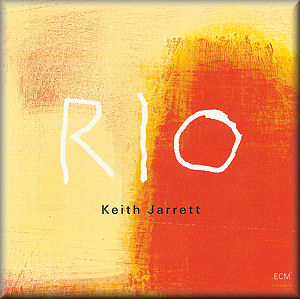Keith Jarrett - Piano
I am getting tired of Keith Jarrett being treated as if he is some kind of saint. A recent article about this album said that "Rio is a masterpiece, a jazz recording of such creativity that it is impossible to absorb the enormity of its achievement in one, two or even three auditions". Jarrett himself is capable of equal hyperbole, talking about this album as if it was a miraculous gift from above, while yet being performed by an unusually talented human. The adjectives he uses to describe the album tell us quite a lot: he says modestly that it is "jazzy, serious, sweet, playful, warm, economical, energetic, passionate".
However, as I suggested in my review of Jarrett's previous solo piano
album: Testament:Paris/London, several decades of giving
such concerts may lead to diminishing returns. That is what seems
to be happening on this double CD, recorded in Rio de Janeiro in April
2011.
For example, Part 1 (there are no titles beyond "Part 1" to "Part 15", so I haven't listed them above) has jerky Stravinskyan zigzagging which doesn't resolve into anything. In Part 3, Keith stops just as he seems to be approaching a melody. You might have thought that a solo piano recital would produce a stream of melodies, but most of Jarrett's playing consists of doodling and repetitious patterns. Just occasionally Jarrett gets close to playing something tuneful, as in Part 5, which starts with meandering over a pedal-point but turns into a hint of the blues.
The second CD is, if anything, slightly more melodious. The opening track (Part 7) is a slow improvisation which achieves poignancy. Part 8 has a swaying Latin rhythm, appropriate for a concert given in South America. Part 9 sounds like a piece by Debussy representing fountains, and Part 11 is a fairly accessible 12-bar blues.
However, Part 10 skitters about the keyboard without much shape or direction, and Part 12 wanders aimlessly. The closing track (Part 15) is based on a seemingly endless trill which sounds like an annoying doorbell and masks the potentially lyrical theme.
Keith's favourite device is to set up an ostinato and then add decorations on top. This may be a kind of improvisation, but the repetitious element eventually becomes wearisome. And many tracks could hardly be classified as jazz, since classical models seem to be almost as prevalent as jazz themes.
This album makes me suspect that Keith Jarrett is not so lavishly clothed as he and his worshippers thinks he is.
Tony Augarde
www.augardebooks.co.uk
